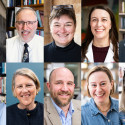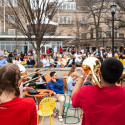Newsmakers

(Every week faculty and staff from across campus are featured or cited in newspapers, magazines, broadcasts and other media from around the country. The listings that follow represent a small selection of the many stories that spotlight UW–Madison and its people. More newsmaker listings)
Visiting Capitol Hill
Joining young scientists and key university administrators from around the country, UW–Madison Chancellor David Ward and professor of medical microbiology and immunology Teresa Compton spent two days on Capitol Hill in Washington this week meeting with Congressional leaders and their staffs to argue the value of scientific research in higher education.
Compton and one of her students spent much of Wednesday, Sept. 22, meeting with the staff of Wisconsin’s Congressional delegation to talk about the importance of academic science and why it needs to be broadly and adequately supported at the federal level.
Understanding East Timor
In the wake of violence and unrest in East Timor, world leaders are trying to understand the tensions that have resulted in the tiny territory of 800,000 people devolving into chaos.
In a report on National Public Radio’s “All Things Considered” (Sept. 7), Donald K. Emmerson, political science professor specializing in Southeast Asia, explained that the current crisis can be traced to the neglect of the Portuguese government to improve living conditions when East Timor, which occupies half of an island in the Indonesian archipelago, was a colony of Portugal.
When Portugal withdrew in 1975, leaving East Timor to Indonesian control, things didn’t get much better, and the island still has alarmingly high rates of poverty and illiteracy. Emmerson spent part of this month in East Timor, observing the island’s independence referendum for the Carter Center. “I could see with my own eyes as I traveled the lengths of the territory – we went to a number of villages and towns – it’s a very bleak landscape,” Emmerson observes.
Uncovering the Indus
Discoveries from the Harappa archaeological site in northern Pakistan were celebrated with customary sweets and entertainment by local drummers.
The project, led by Harvard University’s Richard M. Meadows and UW–Madison’s J. Mark Kenoyer, recently uncovered inscribed shards dating to 2800 B.C., confirming researchers’ beliefs that the people who once lived in the Indus Valley had developed sophisticated methods of writing.
Archaeology Magazine reports that pottery found at the site is inscribed with seals that the researchers believe indicate ownership, and they have also located evidence of the use of standardized weights for trade and taxation.
Warning on education
As students file back into the classroom, they’re finding that schools have gotten tougher. Nationwide, more schools are reinforcing standards of achievement and conduct and meting out real punishment for those who don’t perform.
But, in an article originally appearing in the New York Times, Robert Hauser, professor of sociology, warns that reform efforts can backfire if they aren’t executed carefully.
“If you start with standards and link them to curriculum and teacher training and introduce them over a period of time in ways that permit kids to meet the standards, that may be great. But it won’t be if you go for the quick political fix and start by flunking a lot of kids on tests that are educationally damaging and increase the dropout rate,” says Hauser, who co-wrote a National Research Council report on the dangers of school reform.
Hauser suggests Wisconsin’s attempt at a statewide test failed because the material covered on the test didn’t matter to parents. “Parents saw the test and said they didn’t care if their children learned these things before they graduated,” he says.



